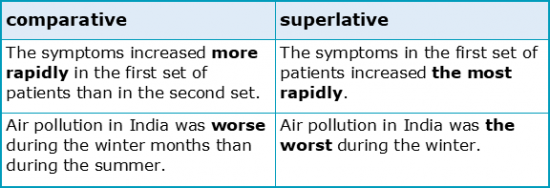What are English comparatives and superlatives?

This is the first of five chapters about Comparatives and Superlatives. To complete this reader, read each chapter carefully and then unlock and complete our materials to check your understanding.
– Introduce the concept of grammatical comparison
– Discuss how morphology and syntax affects comparison
– Provide examples of comparative/superlative adjectives and adverbs
Chapter 1
This short reader deals with the topic of forming and using comparative and superlatives in the English language. Whether you’re practising general English or are a university student studying English for academic purposes, having a confident knowledge of this grammar topic will help you to construct your sentences with more confidence and ease. Over the next five chapters, we’ll discuss the general concepts of comparatives and superlatives, exploring their forms and rules as well as their most useful constructions. If at the end of this reader you would like to test your knowledge of these concepts, don’t forget to unlock and access our beginner-, intermediate- and advanced-level worksheets on this topic.
What is grammatical comparison?
To understand comparative and superlative constructions, it’s important to first recognise that these concepts are linguistically a type of grammatical comparison. Through the use of morphological or syntactic alterations to particular adjectives and adverbs, languages such as English are able to represent three types of grammatical comparison: positive, comparative and superlative.

As the above table demonstrates, the positive denotes a property (smart), the comparative indicates a greater degree of that property (smarter), and the superlative represents the greatest degree of that property (smartest). While many adjectives and adverbs undergo morphological changes to represent these distinctions (in which the suffixes ‘-er’ and ‘-est’ are added to the end of the word), some adjectives and adverbs instead require syntactic additions to demonstrate grammatical comparison. In the English language, these syntactic additions come in the form of the words ‘more/less’ and ‘most/least’.
How are comparatives and superlatives useful?
Comparison is an important feature of any language and will be useful for students regardless of their purpose for learning English. By studying this topic, you’ll not only increase your knowledge of English morphology, syntax and vocabulary, but you’ll also improve your ability to confidently compare two or more entities and demonstrate extremes of scale across select properties.
Because comparisons tend to be more commonly made in speech rather than in writing, learners of general English will initially find studying these constructions more useful. Examples such as those provided in the table below may very well be heard with some frequency in everyday speech:

While many of the above expressions would be too informal for academic writing, there are still a number of comparative and superlative constructions that would likely benefit those studying academically. Whether describing visual data, mapping trends or writing a compare and contrast essay, comparatives and superlatives can be very useful when creating formal assignments if learned correctly:

Chapters 2-5 now deal with comparative and superlative constructions in more detail, exploring the various forms and rules of these constructions as well as providing a number of useful academic expressions.
To reference this reader:
Academic Marker (2022) Comparatives and Superlatives. Available at: https://academicmarker.com/grammar-practice/affixes/comparatives-and-superlatives/ (Accessed: Date Month Year).
Downloadables
Once you’ve completed all five chapters about comparatives and superlatives, you might also wish to download our beginner, intermediate and advanced worksheets to test your progress or print for your students. These professional PDF worksheets can be easily accessed for only a few Academic Marks.
Collect Academic Marks
-
100 Marks for joining
-
25 Marks for daily e-learning
-
100-200 for feedback/testimonials
-
100-500 for referring your colleages/friends